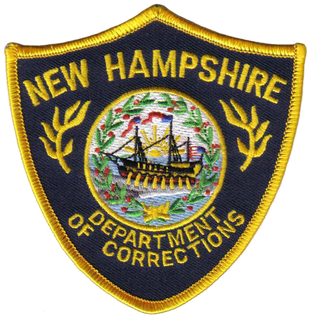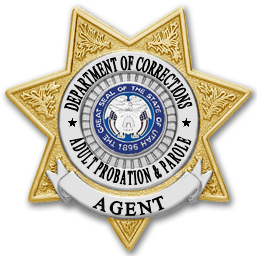
Electronic tagging is a form of surveillance that uses an electronic device affixed to a person.

Parole is a form of early release of a prison inmate where the prisoner agrees to abide by certain behavioral conditions, including checking-in with their designated parole officers, or else they may be rearrested and returned to prison.
Probation in criminal law is a period of supervision over an offender, ordered by the court often in lieu of incarceration.

A probation and parole officer is an official appointed or sworn to investigate, report on, and supervise the conduct of convicted offenders on probation or those released from incarceration to community supervision such as parole. Most probation and parole officers are employed by the government of the jurisdiction in which they operate, although some are employed by private companies that provide contracted services to the government.
The U.S. Probation and Pretrial Services System, also called the Office of Probation and Pretrial Services, part of the Administrative Office of the United States Courts, is the probation office of the federal judiciary of the United States. It serves the United States district courts in all 94 federal judicial districts nationwide and constitutes the community corrections arm of the Federal Judiciary. It administers probation and supervised release under United States federal law enforced by probation officers.

The Tennessee Department of Correction (TDOC) is a Cabinet-level agency within the Tennessee state government responsible for the oversight of more than 20,000 convicted offenders in Tennessee's fourteen prisons, three of which are privately managed by the Corrections Corporation of America. The department is headed by the Tennessee Commissioner of Correction, who is currently Frank Strada. TDOC facilities' medical and mental health services are provided by Corizon. Juvenile offenders not sentenced as adults are supervised by the independent Tennessee Department of Children's Services, while inmates granted parole or sentenced to probation are overseen by the Department of Correction (TDOC)/Department of Parole. The agency is fully accredited by the American Correctional Association. The department has its headquarters on the sixth floor of the Rachel Jackson Building in Nashville.

The New Hampshire Department of Corrections is the government agency in the U.S. state of New Hampshire charged with overseeing the state correctional facilities, supervising probation and parolees, and serving in an advisory capacity in the prevention of crime and delinquency. As of June 30, 2013, the Department had an inmate population of 2,791, 15,267 on probation or parole, and 893 total employees, 470 as corrections officers and 64 as probation/parole officers. The agency has its headquarters in Concord.
The Parole Board of Canada is the Canadian government agency that is responsible for reviewing and issuing parole and criminal pardons in Canada. It operates under the auspices of Public Safety Canada.

The Parole and Probation Administration, abbreviated as PPA, is an agency of the Philippine government under the Department of Justice responsible for providing a less costly alternative to imprisonment of first-time offenders who are likely to respond to individualized community-based treatment programs.
The South Carolina Department of Probation, Parole, and Pardon Services (SCDPPPS) is a state agency in the state of South Carolina in the United States of America. The agency was formed in 1941 as the South Carolina Probation and Parole Board. At that time, the Board simply made recommendations to the Governor regarding parole matters.
David Lynn Harris was an American orthodontist who owned a chain of offices along with his wife, Clara Suarez Harris. The chain was particularly successful, and the couple was able to afford an upscale home and lifestyle in Friendswood, Texas. On July 24, 2002, Clara Harris confronted her husband in a hotel parking lot over an extramarital affair, then struck and ran over him with her Mercedes-Benz sedan, killing him in an act of mariticide. She was convicted of sudden passion and sentenced to 20 years in prison.
In Finland, life imprisonment is the maximum criminal penalty. In actual practice, life imprisonment rarely lasts for the remainder of a convict's life; it currently consists of imprisonment in closed prison and possible periods of imprisonment in a halfway house, supervised parole and full parole. The death penalty was abolished in Finland in 1949 for peacetime offences and for all offences in 1972.
Marsy's Law, the California Victims' Bill of Rights Act of 2008, enacted by voters as Proposition 9 through the initiative process in the November 2008 general election, is a controversial amendment to the state's constitution and certain penal code sections. The act protects and expands the legal rights of victims of crime to include 17 rights in the judicial process, including the right to legal standing, protection from the defendant, notification of all court proceedings, and restitution, as well as granting parole boards far greater powers to deny inmates parole. Critics allege that the law unconstitutionally restricts defendant's rights by allowing prosecutors to withhold exculpatory evidence under certain circumstances, and harms victims by restricting their rights to discovery, depositions, and interviews. Passage of this law in California led to the passage of similar laws in Florida, Georgia, Illinois, Kentucky, Nevada, North Carolina, Oklahoma, Ohio and Wisconsin, and efforts to pass similar laws in Hawaii, Iowa, Montana, Idaho, South Dakota, and Pennsylvania. In November 2017, Marsy's Law was found to be unconstitutional and void in its entirety by the Supreme Court of Montana for violating that state's procedure for amending the Montana Constitution. The Pennsylvania Supreme Court reached the same conclusion as Montana under its own state constitution in 2021.
Private probation is the contracting of probation, including rehabilitative services and supervision, to private agencies. These include non-profit organizations and for-profit programs. The Salvation Army's misdemeanor probation services initiated in 1975, condoned by the state of Florida, is considered to be among the first private probation services. The private probation industry grew in 1992, when "local and county courts began outsourcing misdemeanor probation cases to private companies to alleviate pressure on overburdened state probation officers."
The New Zealand Parole Board is an independent statutory body established in 2002 that considers offenders for parole. Its task "is to undertake an assessment of the risk that long-term sentenced offenders might pose to the safety of the community if they were to be released before the end of their sentence". The Board also sets conditions of release for offenders so their reintegration back in to the community can be effectively managed. Once the conditions are set it becomes the responsibility of Community Corrections to manage the offender." 'Long term' is defined as more than 24 months. Short-term prisoners are automatically released after serving half their sentence.
The New Zealand Probation Service is a branch or service of the New Zealand Corrections Department. Established in 1886, its role is to manage offenders sentenced to community based sentences such as home detention, community detention and intensive supervision. The Service also manages prisoners in the community who have been released on parole and offenders on release conditions at the end of their prison sentence. According to Corrections website, in 2014 the Service was looking after approximately 30,000 offenders in the community. The Probation Officer's role is described as "work(ing) with people on probation to motivate them to make changes in their lives. This may include attending programmes to address violence, alcohol and drug abuse or driving offences."
The Texas Board of Pardons and Paroles (BPP) is a state agency that makes parole and clemency decisions for inmates in Texas prisons. It is headquartered in Austin, Texas.

Adult Probation and Parole (AP&P) is a division of the Utah Department of Corrections (UDC) which is a government agency dedicated to the management and supervision of convicted probationers and parolees in the State of Utah. It is currently led by the Division Director Dan Blanchard and is headquartered in the Utah Department of Corrections Administration Building in Draper.
Sentinel Offender Services is a criminal justice services and original equipment manufacturing company based in Anaheim, California. The company was founded in 1993 by Robert Contestabile, who is currently the Chairman. Tom Flies is Chief Executive Officer.






